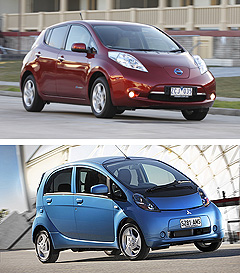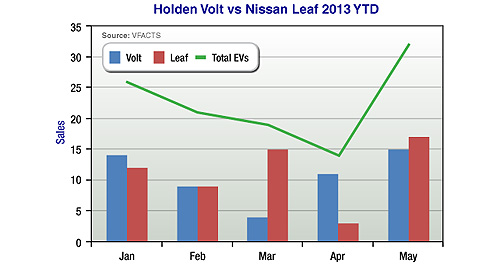News - Market Insight - Market Insight 2013EVs fight for relevance, despite Volt, cut-price LeafHigh and mighty: Holden is refusing to chase sales with its Volt plug-in hybrid by sticking with a fully equipped model rather than offering a lower-priced stripper. EV sales still tiny as widespread issues roll on, but optimism reigns in state trial10 Jun 2013 By TERRY MARTIN THE fledgling electric vehicle industry in Australia is continuing to fight for relevance in Australia, despite the arrival of the Holden Volt plug-in hybrid and recent price cuts to the Nissan Leaf EV. The pioneering Mitsubishi i-MiEV – the first mass-produced EV on the Australian market – has run its course, and Renault’s Fluence ZE, which was meant to shake up the marketplace with a super-low starting price, is no longer a prospect after partner Better Place ran into problems. And there are ongoing ‘roadblocks’ in areas such as vehicle purchase price, practical limitations, recharging costs and supporting infrastructure. Mainstream and luxury car brands alike remain wary about introducing EVs to Australia, but conventional hybrids are soldiering on and plug-in variants are beginning to make an impression on the product planning schedules, with versions of Mitsubishi’s Outlander, Porsche’s Panamera and BMW’s all-new i3 among those confirmed for release here either this year or next. The longer driving range inherent in plug-in hybrids has meant they are now generally considered by car-makers as a better alternative than pure EVs in the Australian context, and a vast array of models is expected in the next two to three years, arriving in accordance with development programs and the slow change in market acceptance. There are, however, no expectations of a sudden boom in plug-in hybrid sales in Australia, while new EVs such as the cute Renault Zoe remain off the agenda while car-makers continue to survey the landscape.  From top: Nissan Leaf and Mitsubishi i-MiEV. From top: Nissan Leaf and Mitsubishi i-MiEV.In releasing its latest report this week, the Victorian government’s EV trial catalogues the ongoing issues involved in owning and operating an electrified vehicle in Australia – but also provides plenty of reason to be optimistic about its future. It describes, for example, how EV prices have dropped by more than 30 per cent since 2010 – thanks to Nissan’s aggressive actions with Leaf – that average running costs for households participating in the trial are between $7 and $10 a week, and how electricity smart meters are allowing EV charging to be better managed. But there are plenty of problems, too, identified in the trial, such as concerns about range, the costs involved in connecting vehicles to the grid (around $2000 to $3000), complex charging arrangements in rental properties, and the lack of workplace charging opportunities. There is also the expectation that it will take until at least 2020 for the EV operating cost advantage to outweigh the purchase price penalty. Priced from $59,990 plus on-road costs, Holden’s Volt has recorded 93 sales since its launch late last year, with 80 of those coming in November and December with the company’s own registrations, dealer test vehicles and orders from ‘early adopters’ – typically organisations who use the vehicle as a marketing tool and individuals who buy it to reflect their passion for technology and the environment. The figures this year better reflect the ongoing demand for the Volt in the marketplace, with sales dropping back to 14 units in January, nine in February and four in March, with April pushing back up to 11 before last month’s 15 new registrations was its best thus far in 2013. That adds up to 53 sales in five months. Holden has not specified sales targets and will not be drawn on admitting whether the Volt will be profitable, preferring instead to highlight its status as a “technological tour de force”. Holden’s executive director of sales and marketing Philip Brook also told GoAuto at the VF Commodore launch last month that the company was still ruling out a cut-price model sans luxury equipment to generate more sales. Reports out of the US, however, indicate that pricing and incentives are becoming more aggressive in the States as car-makers attempt to improve sales, with GM offering rebates of $5000 on 2012 Chevy Volts or $4000 on 2013 models. Special lease deals are also being offered. With Mitsubishi Motors Australia having pre-registered its remaining i-MiEV supplies in December last year, the company has not recorded any sales of the $48,800 EV since then and, GoAuto understands, most of the cars have been sold off cheaply at dealer lots. All up, Mitsubishi sold 250 i-MiEVs since launch in 2010, and the company is now concentrating its EV efforts on the plug-in Outlander SUV due in the first quarter of next year. Recently reduced to $39,990 driveaway, the Nissan Leaf, meanwhile, remains the only mass-produced pure EV in the marketplace, and has gathered similar sales figures to Volt this year with 56 new registrations, including 17 in May which look to be a direct result of the price cut. This is a vast improvement on last year, when 77 Leaf sales were recorded over the 12-month period, from a total national EV market of 206 units. Of the latter, just 47 were private sales. To the end of May, 112 EV sales have been recorded across the board this year, with 36 of these classified as a private sale. It almost pales into insignificance when you consider that well over 100,000 cars in the ‘small’ category that the the Volt and Leaf belong have been sold over the same period. But there is momentum behind electrified vehicles in the global car industry that makes us dwell on the word ‘almost’. Despite the ongoing roadblocks and high-profile problems of key players – Better Place filing for bankruptcy, being one of the latest – there is too much being invested in electric cars worldwide to keep them at 0.02 per cent of the Australian new-vehicle market, as they are now. That percentage will improve, even when 1 per cent looks like a long way off.  Read more7th of June 2013  Mitsubishi i-MiEV has run its coursePioneering i-MiEV peters out in Oz as Mitsubishi switches EV focus to Outlander27th of May 2013  Better Place files for liquidationLack of funds, car-maker battery swap support, sends Better Place into liquidation13th of December 2012  Renault puts indefinite halt on Fluence ZE in AustraliaBetter Place battery-swap stations up to 12 months off, Renault postpones Fluence ZE4th of December 2012  EV range deemed acceptableVictorian trial shows electric-car drivers are comfortable with range, but not price |
Click to shareMarket Insight articlesResearch Market Insight Motor industry news |
















Facebook Twitter Instagram